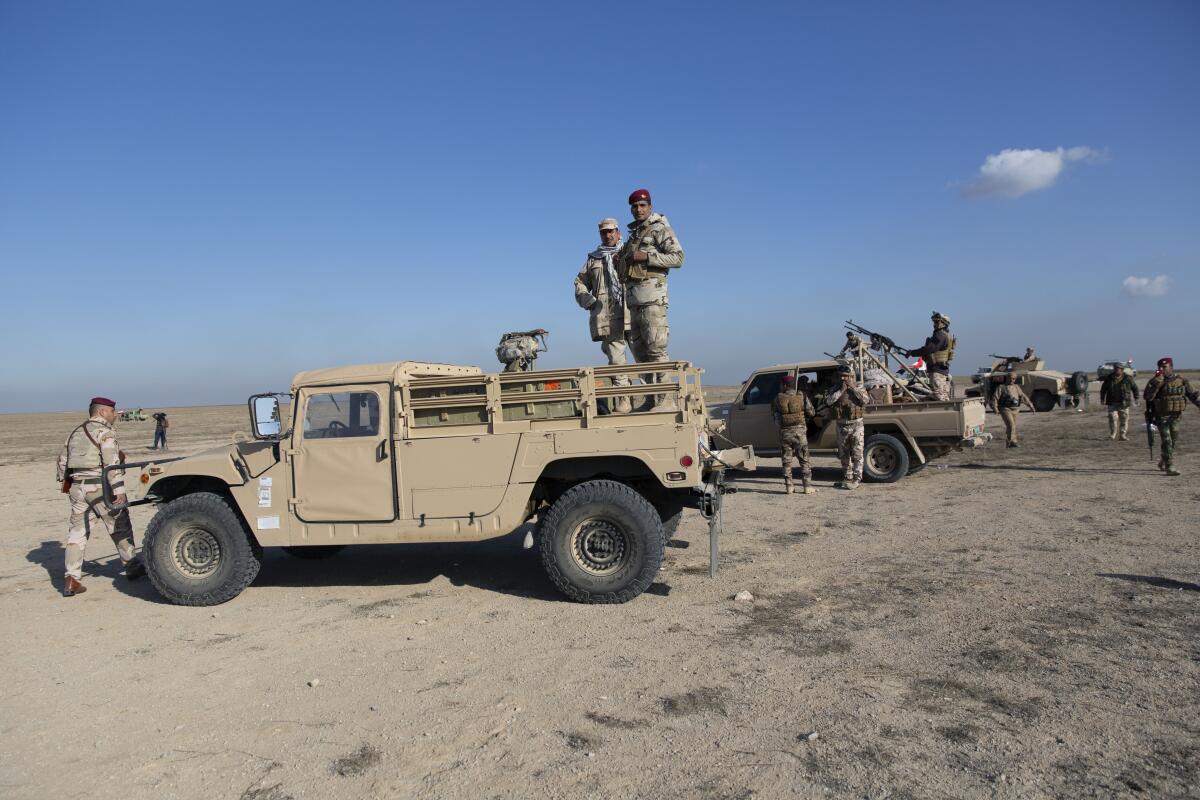U.S. targets Iranian-backed militia with deadly strikes in Iraq and Syria

AMMAN, Jordan — U.S. warplanes struck an Iraqi paramilitary faction on Sunday that Washington had accused of conducting repeated attacks on U.S.-led coalition forces, including an attack on Friday that killed an American contractor in northern Iraq.
The strikes in Iraq and Syria, which targeted Kataeb Hezbollah (the Hezbollah Brigades), represents an unprecedented escalation between the U.S. and Iraq’s paramilitary groups, which are known collectively as the Popular Mobilization Units and are considered by the U.S. to be a proxy force for Iran.
Iraq’s Security Media Cell, which releases official information regarding Iraqi security forces, confirmed the attacks, saying in a statement on Sunday that three U.S. strikes targeted sites near the Iraqi-Syrian border and had killed four fighters, including a commander, and wounded 30 others. Iraqi activists later said the dead numbered 25 fighters.
Washington blames Kataeb Hezbollah for a 31-rocket barrage on Friday that hit the K1 base in the northern Iraqi province of Kirkuk and killed one American civilian contractor and wounded four U.S. servicemen as well as two Iraqi personnel.
Defense Department official Jonathan Hoffman said in a statement Sunday that U.S. forces had, in retaliation, “conducted precision defensive strikes against five [Kataeb Hezbollah] facilities in Iraq and Syria that will degrade” the group’s ability to conduct future attacks against U.S. forces.
Hoffman added that the operation had destroyed five sites used by Kataeb Hezbollah, three in Iraq and two in Syria, and included “weapon storage facilities and command and control locations” the group had used to “plan and execute attacks” on coalition personnel.
“The U.S. and its coalition partners fully respect Iraqi sovereignty, and support a strong and independent Iraq,” Hoffman said. “The U.S., however, will not be deterred from exercising its right of self-defense.“
Jamal Ebrahimi, the deputy head of the Popular Mobilization Committees and the founder of Kataeb Hezbollah — better known by nom de guerre Abu Mahdi Muhandis — threatened that his group would retaliate.
“The blood of the martyrs and the wounded will not go to waste,” he said. “The response will be harsh upon U.S. forces in Iraq.”
Iraqi officials were united in their condemnation of the strikes.
Iraqi President Barham Salih said in a statement the strikes were a “violation of Iraq’s sovereignty” and were “unacceptable.”
The strikes come in the wake of several attacks on U.S. diplomatic and military sites since the start of anti-government protests in Iraq in September. It’s unclear how Washington determined Kataeb Hezbollah was behind those incidents.
Sunday’s strikes were the latest in the shadow war between Iran and the U.S., a conflict that has involved a string of attacks across the region, including in the United Arab Emirates, Saudi Arabia and the Red Sea, as well as Iraq.
Washington had insisted Tehran was behind the attacks but had stopped short of mounting a military retaliation.
More to Read
Sign up for Essential California
The most important California stories and recommendations in your inbox every morning.
You may occasionally receive promotional content from the Los Angeles Times.











